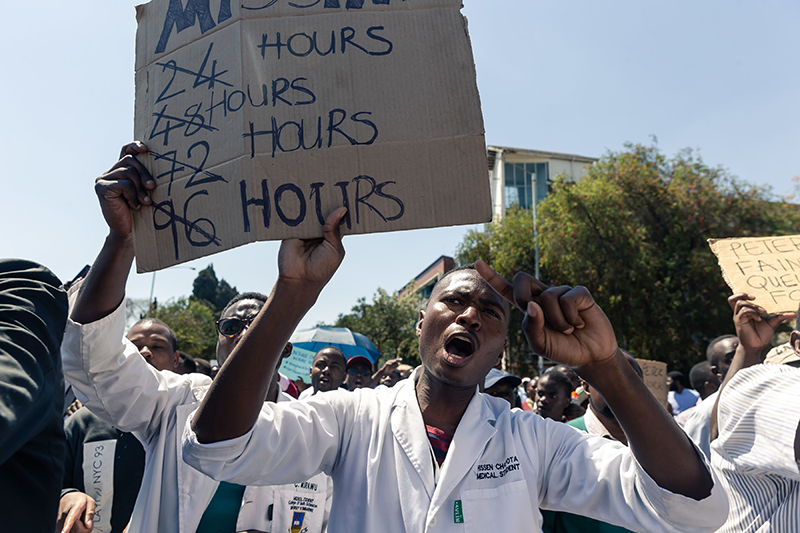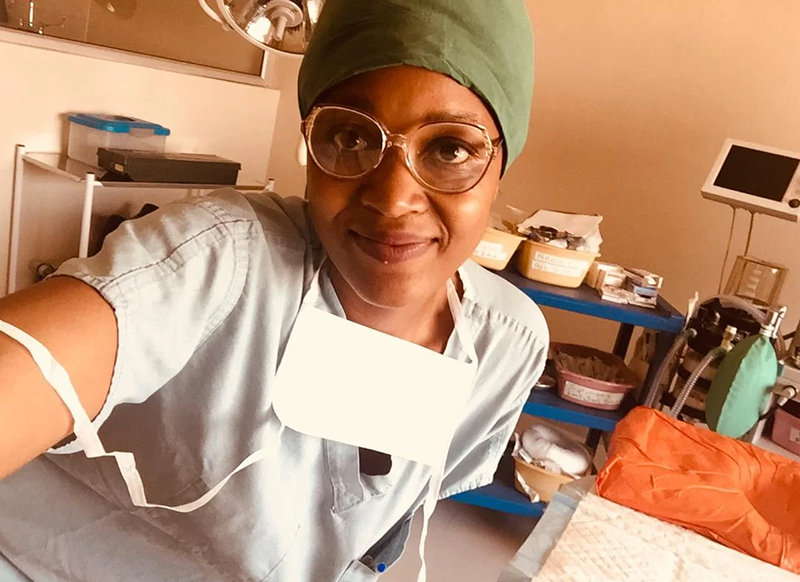- Featured
- No Comment
IN-DEPTH: Concern grows over ‘poor’ quality of doctor training in Zimbabwe

By Clemence Manyukwe I University World News
HARARE: When he was five years old, a medical student was asked what he wanted to do when he grew up. The answer was emphatic: “I want to be a doctor.”
Nearly two decades later, his dream is being realised as he is a final-year medical student at the University of Zimbabwe’s College of Health Sciences, which offers degree programmes in medicine, dentistry, pharmacy, nursing science, medical laboratory sciences, rehabilitation, radiology and health education as well as health promotion.
Zimbabwe has four medical schools. The University of Zimbabwe has an enrolment of 180 students, the National University of Science and Technology 60; the Midlands State University 20 and Great Zimbabwe University also about 20.
But the medical student who yearned for a medical education and career at the age of five now has worries about what he signed up for to fulfil his dreams as a child.
This is because of perceptions that the falling standards of training coupled with the poor conditions of work for medical doctors in Zimbabwe have resulted in a brain drain which has picked up in recent months.
Demoralisation
In an interview with University World News, the student, who spoke on condition of anonymity, opened up about the lack of resources at the university, a situation that is giving medical students a hard time during their studies.
He said the fact that he is studying at a time when a street hustler in Harare can make more than a medical doctor, is demoralising.
Zimbabwe has been in a state of economic decline for about two decades and this has been sustained by, among other things, recurrent disputed elections.
A pledge to turn around the country’s economic fortunes by President Emmerson Mnangagwa, who seized power in November 2017 in a plot that involved the country’s generals against long-time ruler Robert Mugabe, has proved to be an empty promise.
A demotivating scenario

The student said it is demotivating for medical students to know that, after graduating, they would not be able to buy a car or furnish an apartment. He said studying becomes an uphill task after hearing those who graduated before you saying: “Finish and join the suffering.”
He said the question of how one would afford to buy a residential stand and build a home on it on such a meagre salary is troubling.
Even so, he does not regret his choice.
This is because of the joy of seeing a patient recovering to original fitness, sending patients home alive and well, regardless of their low socioeconomic status, as well as making a unique diagnosis that gets confirmed.
Teaching staff
But what is the state of education in medical schools?
A second-year female student said medical students do not have enough lecturers.
“For instance, we failed to do [the] Local Languages Course part 1.2 because we didn’t have a lecturer. [The] same dilemma has struck this semester – and this will pile up to the material for next semester, thereby placing a hard rock on top of the already impractical modular learning,” she said.
The University of Zimbabwe introduced what are called ‘compass-wide’ courses that every student is required to do and, in line with that, local languages have been added to courses, regardless of the studies one is pursuing.
Apart from local languages spoken in Zimbabwe such as Shona and Ndebele, to communicate with locals there are also heritage studies that authorities say are important to instil a sense of patriotism in students.
Learning and teaching challenges

The student said the modular learning approach that has been adopted in universities is straining and does not allow students to cover much ground.
Students used to learn all the content of various courses and write exams at the end but, under the modular learning system, they do a section of the work and write an exam immediately after they have covered it.
“Sometimes, lecturers end up telling us to read only a certain part [of the work] that is to come in an examination. This is a major disadvantage because a certain course will require basic knowledge of a certain topic in another course,” she said.
“With modular learning, you may learn the course but there may not be time for assimilation. They can say you are doing histopathology in six weeks, then you write the exams, then you move to medical microbiology, then, in six weeks, you write exams. There is not much time to assimilate with the courses and those six weeks may not be enough [time] to cover everything.”
She said there is also a lack of resources in other departments which require practical work, such as the physiology department, where they could not even have an endocrine physiology practical as per the manual.
There are also residency issues due to lack of accommodation.
“There is a lack of resources. We had one female specimen (cadaver) for 345 students in anatomy. This reduces the quality of our practical knowledge,” she added.
Academics
Dr Norman Matara of the Zimbabwe Association of Doctors for Human Rights told University World News: “You raise a critical issue with this story, but I think your questions should be answered by a medical doctor in academia.”
A number of medical doctors in academia declined to comment, saying they were not authorised to do so, as they were government employees.
They directed the questions raised by University World News to Health Minister Douglas Mombeshora, who did not respond.
A lecturer, who was willing to speak to University World News on condition of anonymity, said that, to improve quality at the country’s top medical schools, what is generally required is investment in lecturers, infrastructure and student well-being.
“If you don’t pay lecturers, they won’t stay and new ones won’t want to join the faculty,” the lecturer said.
The lecturer also noted that there was a need for training opportunities to support lecturers’ careers.
Has quality slipped?
The state of affairs is a far cry from the qualifications students used to obtain at the University of Zimbabwe.
In 2017, University World News reported that graduates from the University of Zimbabwe’s college of health sciences had qualified to automatically secure licences to practice in California in the United States upon completion of their studies.
At the time, authorities at the institution of higher learning said the implication of the landmark development was testimony to the far-reaching and quality training that characterises the University of Zimbabwe – something that appears to have slipped.
According to available data, that corresponds with information from the World Health Organization, Global Health Workforce Statistics and UNICEF (the United Nations Children’s Fund), among others, “With about 3,080 physicians in Zimbabwe, there are about 0.19 doctors per 1,000 inhabitants. Here, again, the comparison: worldwide, this standard is 1.70 physicians per 1,000 inhabitants and, in the European Union, it is 4.28.”
Systemic crisis
In an interview with University World News, Emmanuel Sitima, the president of the Zimbabwe National Students Union, ZINASU, said the crisis extends beyond medical colleges to all departments at universities.
He said that, as part of the solution to problems bedevilling Zimbabwe’s higher education sector, the government must increase the allocation in the education budget so that the national budget meets the Dakar declaration threshold of 20% allocation towards education.
Sitima said Zimbabwe is a signatory to the Dakar declaration, hence it is imperative for the government to honour its pledge.
He said both students and lecturers are affected by the prevailing situation.
“The economic hardships in the country are affecting everyone and lecturers are not an exception. Poor remuneration has become the national chorus of every civil servant.
“Lecturers are being paid peanuts and that has caused a brain drain in institutions of higher learning. A lot of experienced and senior lecturers are leaving Zimbabwe to seek greener pastures – hence, the shortage of lecturers,” he said.
“Those who have agreed with the notion that half a loaf is better than nothing, are not motivated enough to provide quality services, and the major worry now is that universities risk producing half-baked graduates.”
He said it is true that some street hustlers make more than those working after spending years studying at universities, but added that some graduates are now opting to join the hustle on the streets rather than do the jobs they were trained for.
“Due to the high levels of unemployment, it’s difficult these days to differentiate between a street hustler and a graduate in our teapot-shaped motherland because we now have degreed vendors, degreed illegal money changers and degreed street hustlers,” added Sitima.
In October 2023, Bloomberg reported that years of mass migration from Zimbabwe have gained fresh impetus as an economic meltdown continues unabated, further denuding the country of the scarce skills it needs to engineer an economic turnaround.
The report further confirmed an ongoing brain drain to the United Kingdom, which issued visas to 20,152 Zimbabwean health and social care staff in the 12 months prior to June 2023 through June, an almost fivefold increase from the year before.
The movement of skilled Zimbabweans to the UK was said to be the third-most in the category after way-more-populous Nigeria and India, foreign office data showed, according to the news report.
